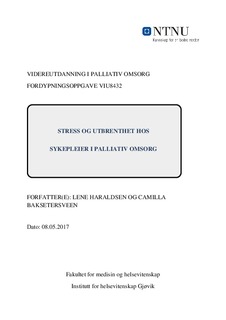| dc.contributor.advisor | Tømmerbakk, Marit | |
| dc.contributor.author | Haraldsen, Lene | |
| dc.contributor.author | Baksetersveen, Camilla | |
| dc.date.accessioned | 2017-08-09T07:16:50Z | |
| dc.date.available | 2017-08-09T07:16:50Z | |
| dc.date.issued | 2017 | |
| dc.identifier.uri | http://hdl.handle.net/11250/2450224 | |
| dc.description.abstract | Introduksjon: Tidligere forskning viser at det er indikasjon på at det er utbredt forekomst av stressrelatert bekymring og utbrenthet blant sykepleiere som jobber innen palliativ omsorg. Forskjellige mestringsstrategier anvendes som et verktøy for å skape en kontroll over konflikter og indre og ytre krav. Hensikt: Hensikten med denne studien er å gi et bidrag til forståelsen for hva som er risikofaktorer for stress og utbrenthet hos sykepleiere som jobber i palliativ omsorg og se på aktuelle tiltak som kan benyttes for å bedre kunne håndtere stress og forebygge utbrenthet.
Metode: Litteraturstudie som bygger på forskningsartikler.
Resultat: Det ble inkludert fem artikler i litteraturstudien. Faktorer til stress og utbrenthet ble relatert til kommunikasjon, relasjoner og organisatoriske forhold. Det vises til at forskjellige mestringsstrategier hos sykepleiere kan ha en beskyttende faktor.
Konklusjon: Å bli eksponert for lidelse og død over en lengre tidsperiode viser seg å være en risikofaktor. De mest belyste risikofaktorene er utfordringer knyttet til kommunikasjon, formidling av informasjon, relasjonsutfordringer samt ulike faktorer i arbeidsmiljøet. Det viser seg at sykepleiere som utnytter tilstrekkelige mestringsstrategier er bedre rustet til å takle stress og kan være mindre utsatt for utbrenthet. Egenomsorg blir sett på som et av de mest egnede alternativene. | nb_NO |
| dc.description.abstract | Introduction: Research indicates that there exists a widespread occurrence of stress-related anxiety and burnout among nurses who work in palliative care. Different coping strategies can be used as a tool to manage conflict as well as the internal and external demands of the job. Aim: The aim of this study is to contribute toward understanding the risk factors for stress and burnout among nurses who work in palliative care and identify appropriate measures that can be used to better manage stress and prevent burnout.
Methode: Literatur review based on scientific research papers.
Results: Five papers were included in this review. Risk factors for stress and burnout were found to be related to communication, relationships and organization. Different types of management strategies used by nurses were shown to have a protective effect.
Conclusion: Exposure to suffering and death over prolonged periods of time proved to be a risk factor. The most common risk factors however were the challenges related to communication, information dissemination, inter-relational challenges as well as the various factors in the working environment. It was shown that nurses who utilize adequate coping strategies are better equipped to manage stress and may be less prone to burnout. Taking good care of oneself is regarded as one of the most suitable strategies. | nb_NO |
| dc.language.iso | nob | nb_NO |
| dc.subject | Palliativ omsorg | nb_NO |
| dc.subject | Sykepleier | nb_NO |
| dc.subject | Stress | nb_NO |
| dc.subject | Utbrenthet | nb_NO |
| dc.subject | Mestring | nb_NO |
| dc.subject | Palliative Care | nb_NO |
| dc.subject | Nurses | nb_NO |
| dc.subject | Stress | nb_NO |
| dc.subject | Burnout | nb_NO |
| dc.subject | Coping | nb_NO |
| dc.title | Stress og utbrenthet hos sykepleier i palliativ omsorg | nb_NO |
| dc.title.alternative | Stress and burnout among nurses who work in palliative care | nb_NO |
| dc.type | Student paper, others | nb_NO |
| dc.subject.nsi | VDP::Medical disciplines: 700::Health sciences: 800::Nursing science: 808 | nb_NO |
| dc.source.pagenumber | 44 | nb_NO |
